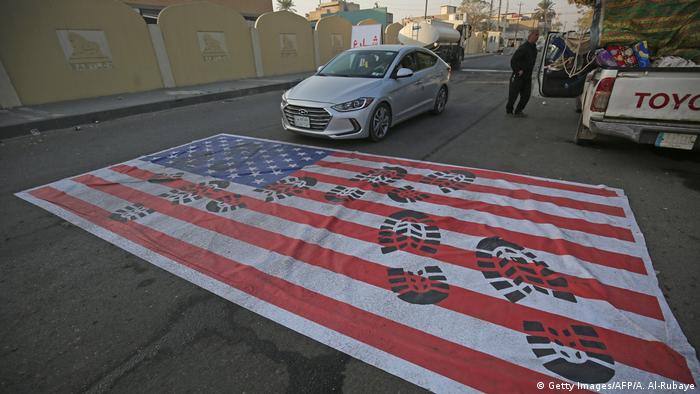Opinion: Trump's Pyrrhic victory
Iran has forced America's hand, and potentially pushed its troops out of Iraq. But effects of the US strike on Iran's top military figure may not be what the White House hoped for, says guest contributor Rainer Hermann.

General Qassem Soleimani was the second most powerful man in the Islamic Republic of Iran, right behind Supreme Leader Ayatollah Khamenei.
Though others may have held a higher formal rank, it was his strategic prowess as a commander that allowed him to expand Iran's influence in the region to a degree unimaginable to the leaders of the Islamic Revolution of 1979.
Khamenei is undoubtedly the religious and political leader of the republic, but it was Soleimani, his trusted associate, who was its military leader.
Thus, Soleimani's assassination will greatly pain Iran. It will also be a test of Khamenei's credibility, for it was he who boasted that US President Donald Trump could do nothing to harm Iran this past December. Now Khamenei has threatened "hard retaliation," and that it is something that cannot be taken lightly.
Still, much as the elimination of Saddam Hussein soon turned out to be a Pyrrhic victory a decade ago in Iraq, Soleimani's killing may not ultimately pay out the dividends that Washington expects.
Turning against the US
Iran is currently suffering on two fronts: Domestic protests call into question the legitimacy of the Islamic Republic, and protests in Iraq object to its influence abroad. At home, General Soleimani was a beloved figure because he restored some of the nation's lost luster. His death will give the beleaguered government much-needed support among the people.
Moreover, those in Iraq who want to be rid of American troops will also see a boost. It will be easy for them to argue that US troops have abused their mandate — to coordinate with Iraqi troops in the fight against "Islamic State" (IS).
Therefore, it would seem that Iran's plan to provoke the US into acting in such a way that the Iraqi people would turn against its troops seems to have worked. It would also seem that if this is the case, Iran will have won twice: The Iraqi protest movement will have been temporarily quelled, and Iran could once again keep its neighbor on a short leash.
Futile actions lacking real strategy
By now, the US must realize that its campaign of "maximum pressure" against Iran has done nothing to protect American interests inside Iraq, but rather, has put them in harm's way. Furthermore, the US has been unable to curb Iran's influence across the Middle East. In fact, quite the opposite has been the case, with Iran acting more aggressively each passing day.
Iranian leadership is most likely weighing its options to determine whether it makes more sense to attack America head-on, or to go after targets held by US allies in the region. Should Iran attack directly it will take up the gauntlet that Trump has thrown at its feet with Soleimani's assassination. But Iran could also use its numerous proxy militias to go after a wide range of US allies in the region.
Read more: The United States and Iran — Decades of enmity
If Iran were to attack the United Arab Emirates (UAE) or Saudi Arabia, for instance, the United States would be forced to decide whether to stand by those allies or not.
If Washington chooses to do so, it would allow the country to be drawn into yet another war with unknown consequences — and the risk of a large-scale regional conflagration would become very real.
Should the US choose not to act, that, too, would dramatically tip the balance of power in the region — at enormous cost to the West.
 Rainer Hermann, political editor for Germany's Frankfurter Allgemeine Zeitung
Rainer Hermann, political editor for Germany's Frankfurter Allgemeine Zeitung
Though others may have held a higher formal rank, it was his strategic prowess as a commander that allowed him to expand Iran's influence in the region to a degree unimaginable to the leaders of the Islamic Revolution of 1979.
Khamenei is undoubtedly the religious and political leader of the republic, but it was Soleimani, his trusted associate, who was its military leader.
Thus, Soleimani's assassination will greatly pain Iran. It will also be a test of Khamenei's credibility, for it was he who boasted that US President Donald Trump could do nothing to harm Iran this past December. Now Khamenei has threatened "hard retaliation," and that it is something that cannot be taken lightly.
Still, much as the elimination of Saddam Hussein soon turned out to be a Pyrrhic victory a decade ago in Iraq, Soleimani's killing may not ultimately pay out the dividends that Washington expects.
Read more: US, Iran on precipice of unpredictable war
Turning against the US
Iran is currently suffering on two fronts: Domestic protests call into question the legitimacy of the Islamic Republic, and protests in Iraq object to its influence abroad. At home, General Soleimani was a beloved figure because he restored some of the nation's lost luster. His death will give the beleaguered government much-needed support among the people.
Moreover, those in Iraq who want to be rid of American troops will also see a boost. It will be easy for them to argue that US troops have abused their mandate — to coordinate with Iraqi troops in the fight against "Islamic State" (IS).
Therefore, it would seem that Iran's plan to provoke the US into acting in such a way that the Iraqi people would turn against its troops seems to have worked. It would also seem that if this is the case, Iran will have won twice: The Iraqi protest movement will have been temporarily quelled, and Iran could once again keep its neighbor on a short leash.
Futile actions lacking real strategy
By now, the US must realize that its campaign of "maximum pressure" against Iran has done nothing to protect American interests inside Iraq, but rather, has put them in harm's way. Furthermore, the US has been unable to curb Iran's influence across the Middle East. In fact, quite the opposite has been the case, with Iran acting more aggressively each passing day.
Iranian leadership is most likely weighing its options to determine whether it makes more sense to attack America head-on, or to go after targets held by US allies in the region. Should Iran attack directly it will take up the gauntlet that Trump has thrown at its feet with Soleimani's assassination. But Iran could also use its numerous proxy militias to go after a wide range of US allies in the region.
Read more: The United States and Iran — Decades of enmity
If Iran were to attack the United Arab Emirates (UAE) or Saudi Arabia, for instance, the United States would be forced to decide whether to stand by those allies or not.
If Washington chooses to do so, it would allow the country to be drawn into yet another war with unknown consequences — and the risk of a large-scale regional conflagration would become very real.
Should the US choose not to act, that, too, would dramatically tip the balance of power in the region — at enormous cost to the West.
 Rainer Hermann, political editor for Germany's Frankfurter Allgemeine Zeitung
Rainer Hermann, political editor for Germany's Frankfurter Allgemeine Zeitung
No comments:
Post a Comment